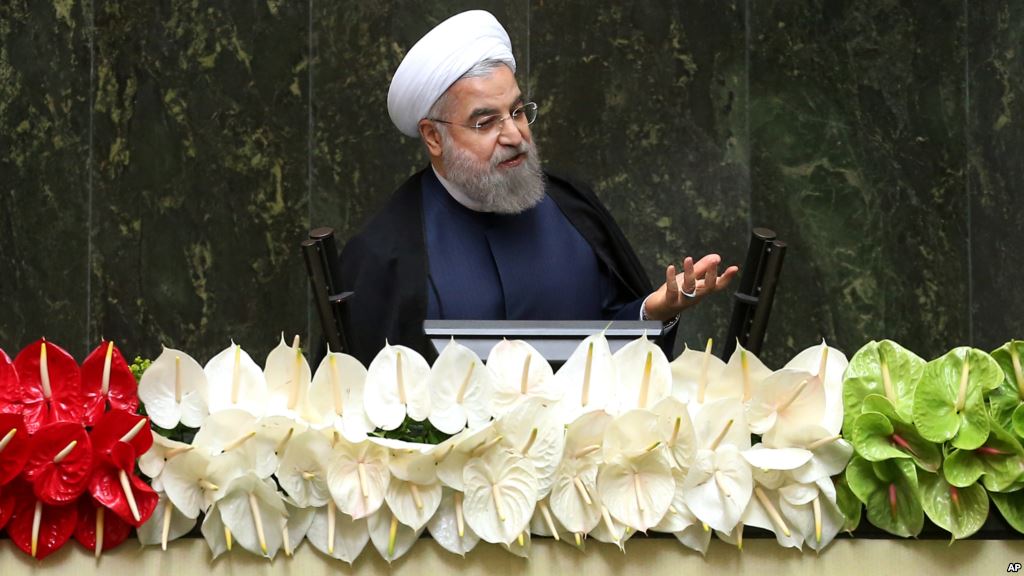London – Iranian President Hassan Rouhani threatened to withdraw from the Joint Comprehensive Plan of Action announced in Vienna last year, if the United States failed to meet its commitments.
During a ministerial meeting held on Wednesday, Rouhani said that Tehran could quickly restart uranium enrichment if the P5+1 countries breached their commitment.
The Joint Comprehensive Plan of Action (JCPOA), commonly known as the Iran deal, is an international agreement on the nuclear program of Iran, reached in Vienna on July 14, 2015 between Iran and the five permanent members of the United Nations Security Council, including China, France, Russia, United Kingdom, United States, plus Germany and the European Union.
On the first anniversary of his country’s landmark nuclear deal, Rouhani said Iran would continue to adhere to the terms of the deal but expressed wariness over whether the other signatories would do so.
He added that breaching the agreement would harm all the concerned parties.
Under the agreement, Iran agreed to eliminate its stockpile of medium-enriched uranium, cut its stockpile of low-enriched uranium, and reduce by about two-thirds the number of its gas centrifuges for 13 years, in exchange for the lifting of international sanctions that had crippled its economy. The pact went into effect in January.
A new German intelligence document reported that Iran continues to break the agreement. Germany’s domestic intelligence agency said in its annual report that Iran has a “clandestine” effort to seek illicit nuclear technology. The findings by the Federal Office for the Protection of the Constitution, Germany’s equivalent of the FBI, were issued last week.
In Iran, internal disagreements continued over the nuclear agreement, in the wake of international stalling in lifting international restrictions on trade relations with the Persian state.
Many high-ranking officials have expressed their objection to the international agreement, while the government responded to criticism by saying that the deal has put some people’s personal interests at stake.
For his part, Rouhani said preserving steady cooperation between Iran and the six powerful countries would contribute to international peace and stability.
Despite feelings of deception in the Iranian arena, Rouhani stressed that the nuclear agreement was an opportunity for growth and for the creation of new jobs for young Iranians.
He also noted that the nuclear deal that was forged a year ago was a proof of Iran’s political and legal ability to solve the world’s most complex issues.
Meanwhile, the spokesperson of Iran’s National Security and Foreign Policy Committee, Hossein Naqavi Hosseini, said that Foreign Affairs Minister Mohammed Javad Zarif would present a detailed report on the implementation of the nuclear deal during the six months that followed its entry into force.
Zarif is expected to reply to questions raised by parliamentarians on the situation in the Middle East and Iran’s policy in the region.
In the same context, Iranian Foreign Minister’s Assistant Hamid Baeidinejad said that opposing plans by Boeing Company to sell aircrafts to Iran was a breach to the nuclear deal. He added that the foreign affairs ministry was deploying efforts to resolve obstacles facing the implementation of the international agreement.
Iranian officials have accused the U.S. of deliberately discouraging business dealings with Iran. The plan by Boeing Co. to sell 80 passenger aircrafts to Iran’s national carrier has faced opposition from U.S. Congress.
Many Iranians believe that the heavily publicized economic benefits that were to be ushered in by the deal have not been materialized quickly enough.
However, Baeidinejad said in a news conference held on Wednesday that Iranian expectations should be “realistic”, implicitly referring to the lifting of banking and financial sanctions on the Persian state.
A new poll conducted for the Center for International and Security Studies at Maryland (CISSM) by the independent polling organization IranPoll.com in June showed that right after the deal was reached on July 14 last year, 76 percent of Iranians approved of it. The figure has since dropped to 63 percent, the poll found, with just 22 percent strongly approving of it in June 2016.
